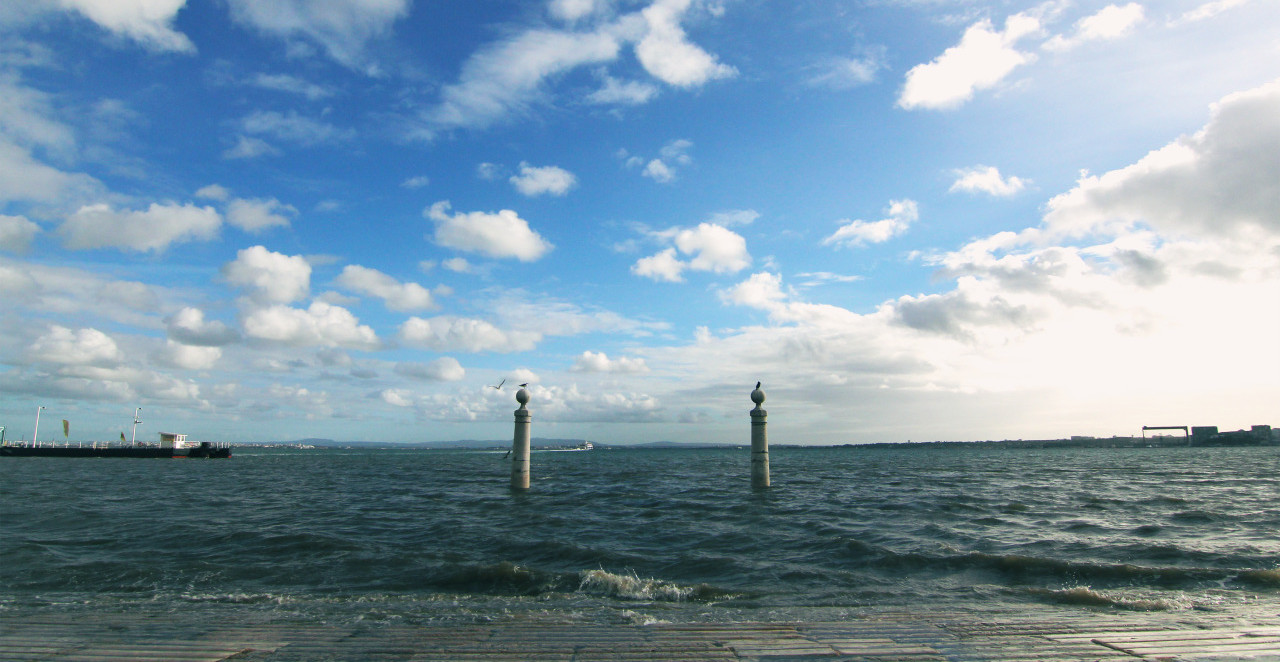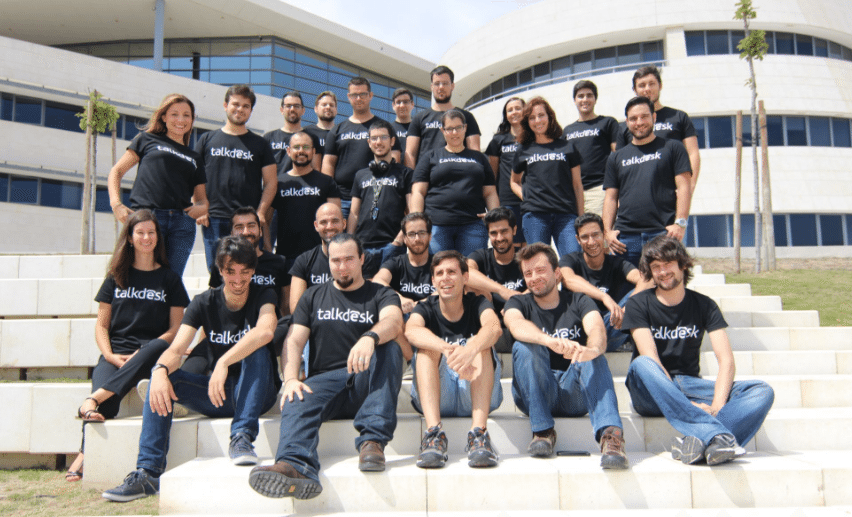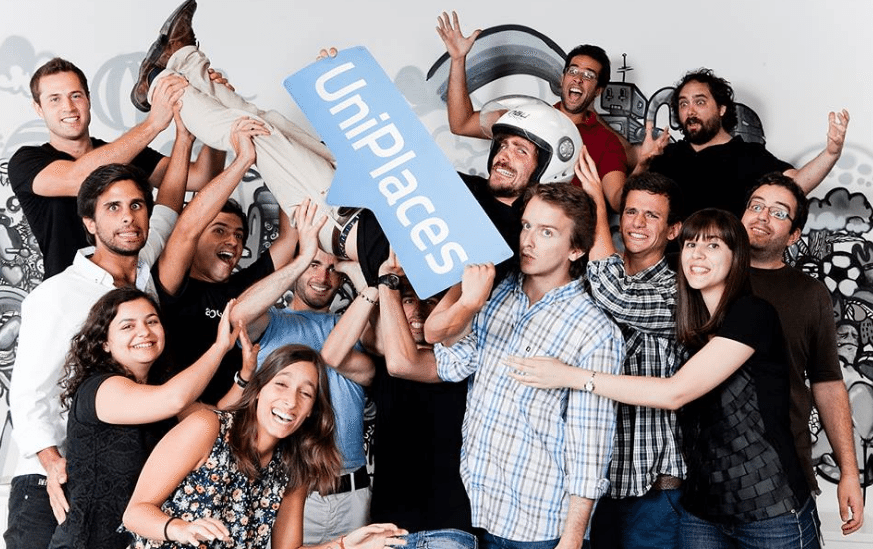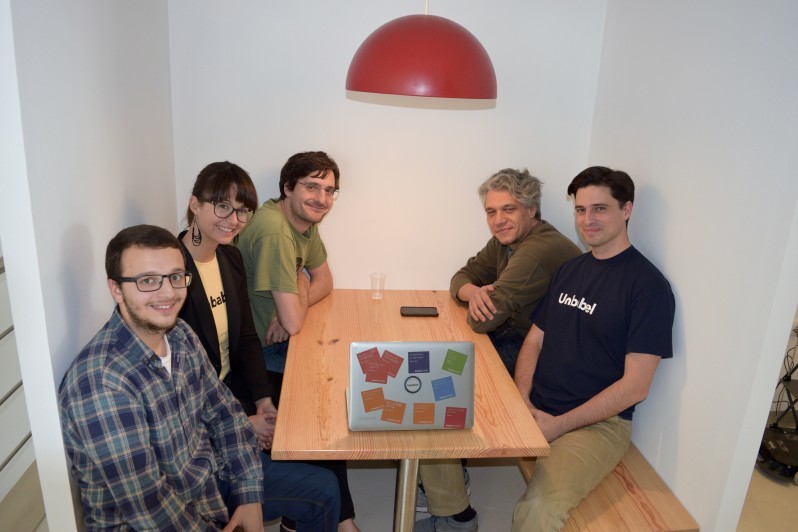
by maria | May 4, 2016 | Uncategorized
‘Hey Maria. Saul Klein was just confirmed as speaker for the Lisbon Investment Summit 2016. Do you want to interview him?’
Wait. Let me just stop for a moment here. Saul Klein? The Saul Klein? The one who is a former partner at Index Ventures, considered by many as Europe’s leading VC? The founder of Lovefilm International, which was acquired by Amazon? The founder of Seedcamp and Kano, the incredibly fun computer kit for kids (well, I kind of want one for myself)? Yes, that’s the man we’re talking about here.
Saul Klein, has spent the last 2 decades building and exiting companies in the US, Israel and Europe, and, despite my startling nervousness, of course I wanted to interview him. So, I had brief conversation with him over the phone last week, while he took a cab drive in London, I imagine. However, this quick chat was more than enough for me to understand that he’s not the average type of investor. Why? Because he’s truly passionate about building great products and helping entrepreneurs with their challenges, at the earliest change.
So, who is Saul Klein, in which kind of startups does he invest, and what will he do in Lisbon?
“We focus on the surfers, not the waves”
When leaving Index, Saul Klein, realised that what he’s most passionate about is starting companies. “It’s a stage of a company’s life cycle that I find incredibly exciting – it’s in my blood and I can’t shake it” as he admits.
So, the man who considers himself as an “an accidental VC” moved on from Index to focus entirely on helping startups in what he likes to call “inception stage”, with Local Globe VC. And what is inception stage you ask? “It’s the earliest stage, when startups are still building the product, setting up the team, and go-to-market strategy is not yet finalised” explained Saul over the phone.
But how does Saul and Local Globe VC choose the founders they’re gonna work with?
According to Saul, they usually invest in founders “who have a good product sense, unique insights, who are targeting a big market, and who are based in London”. Why? “Because we give the mentoring and feedback but then, it’s up to the entrepreneur to go forward with their own company – we just have to trust that the founders we invest in will be smart and take the right decisions”.
But he goes even further at describing their investment strategy. When I asked if he was looking at specific industries he confidently replied: “No, we focus on the surfers, not the waves”. Meaning, in Saul’s opinion, it all comes down to the founders, the core team and the size of the market, other than particular industries, sectors or business models.
“We always ask ourselves: can this business be big at scale? Is the market big enough? Are these founders capable of raising from top tier investors? Because if you’re unable to fundraise, then it probably means you’re unable to sell to big customers…”
So, what will Saul Klein be doing in Lisbon this June?
Well, he’s using the Lisbon Investment Summit as an excuse to come and get to know the Lisbon startup scene. “I know some startups who are in Lisbon, like for example Uniplaces, and I think it’s a very promising ecosystem”. He even admits that he’s “a bit late for the party” but he’s looking forward to getting to know the local tech community this year with the Lisbon Investment Summit, and then later on the Web Summit.
At this point, I hear the cab’s door close and I know we’ve ran out of time. Saul is a busy man so I politely say goodbye by thanking him for the interview, and Saul kindly replies: “You’re welcome, see you in Lisbon soon”.
Well, and if he can say all this in a 15 min. interview, in a cab, imagine how much we’ll all learn from him at #LIS16… You should probably get your ticket, like now.

by maria | May 4, 2016 | Uncategorized
Over the past couple of years, Lisbon has been called Europe’s Silicon Valley or the new Berlin, and considered by the media as one of the most promising startup hubs. With emerging startups such as Uniplaces, the student accommodation platform that raised one of the biggest Series A in Europe, Talkdesk, a cloud based call centre software which has been growing like crazy, or even Unbabel, the crowd-sourced translation platform that was the first Portuguese startup on Y Combinator, Lisbon is quickly turning into a trending startup haven. And, with the Web Summit moving here this year… well, let’s just say that things will get even more hectic.
However, while everybody else finds it easier to compare what’s happening here with other well-known startup hubs, Lisbon, on its end, is not trying to set itself as a follower, but as a leader instead. As Pedro Rocha Vieira, President of Beta-i, puts it: “We are a far cry from the zombie lifestyles of some of the bigger tech hubs. We don’t need to be the Silicon Valley of Europe, we can be Lisbon.”
But, what is it like to “be Lisbon”? What are the concrete numbers and stats of this promising startup ecosystem? How is it different from other startup hubs? And, most importantly, why should you care?
To answer all these questions, we have decided to create a brief overview of Lisbon’s startup scene, so that in the end, we can all agree that Lisbon has its own identity and is not something else.
A wave of global startups in Lisbon

“The Portuguese are known for their cross-ocean endeavours, for their curiosity about places not yet known or even heard of.” Startup Ship
Portugal is a 10 million people market, nothing compared to the US, Germany, and the UK. However, while many see this as a handicap, when it comes to creating businesses, this has actually a remarkable advantage.
Startups in Lisbon are born global. There’s no way a startup can grow at scale with a 10 million people market. Therefore, from the very first day, entrepreneurs need to think of how to expand into other markets.
But, which startups should you watch? Who are the entrepreneurs who have actually built businesses from Lisbon to the world? Here are a few examples (all data taken from Crunchbase).

Product: Cloud-based call centre software
Founders: Tiago Paiva and Cristina Fonseca (on Forbes 30 under 30 list)
Investment: latest round of $21 million led by Salesforce Ventures; and overall – $24.45 million
Accelerator: 500 Startups
Number of employees: 150 (with offices in Lisbon and San Francisco)
Customers: companies like Dropbox, Prezi and Anki
Media: Techcrunch, Forbes, Venture Beat, Fortune

Product: Student accommodation booking platform
Founders: Miguel Amaro, Ben Grech and Mariano Kostelec
Investment: latest round of $24 million in Series A led by Atomico in 2015; and overall $28.94 million
Accelerator: Lisbon Challenge
Number of employees: 150 (with offices in Lisbon and London)
Number of cities: 38
Revenue generated to property owners: $25 million
Media: Techcrunch, Politico, Forbes

Product: Independent android app store
Founders: Paulo Trezentos (confirmed speaker at the Lisbon Investment Summit), Álvaro Pinto and Inês Rola
Investment: latest round of $4 million in Series A led by e.ventures; and overall $4.91 million
Number of daily active users: 1.5 million
Media: Techcrunch, Boston Globe, Tech in Asia

Product: Crowd-sourced translation platform
Founders: Vasco Pedro, Sofia Pessanha, João Graça, Bruno Prezado, Hugo Silva
Investment: $1.5 million
Accelerator / Investor: Y Combinator
Media: The Next Web, Techcrunch, Forbes, Politico

Product: Mobile & web golf performance optimization platform
Founder: Anthony Douglas
Investment: undisclosed
Number of countries: 120
Number of users: 800.000
Accelerator / Investor: Seedcamp

Product: e-commerce platform that rents designer dresses
Founder: Filipa Neto and Lara Videiro
Investment: $2.27 million
Number of countries: 14
Number of customers: 230.000
Media: Techcrunch, Forbes, The Guardian, Vogue
Investment: giving you the numbers

Since the previous edition of the Lisbon Investment Summit in 2015, Portuguese startups have raised more than €130 million. And in a recent report on the Portuguese startup ecosystem, where SEP identified 40 scale-ups, which have raised €156 million, you can clearly understand that this growth has really taken off over the last couple of years.
However, despite having very interesting VCs in Portugal such as Caixa Capital, Portugal Ventures or Faber Ventures, some startups struggle to raise beyond Series A from Portuguese Investors. What happens in most of these cases is that the entrepreneurs raise from international investors. For instance, Caixa Capital is known to have a broad network of international investors, which is extremely useful when Portuguese entrepreneurs need to reach out foreign investors to raise more capital.
Nonetheless, over the last few months, the government has been trying to fight this and help create better conditions for startups and investors, by unlocking more capital for the sector. They have very recently launched a program called Startup Portugal, with 15 new policies to support the growing startup ecosystem by investing and helping Portuguese VCs, business angels, accelerators, incubators and startups, with more than 400 million euros. But, up until now, it’s undeniable that most Portuguese startups have been raising from international investors, and in certain cases it often adds up to 100% of the capital.
Over the past couple of years, we’ve seen startups in Portugal raise from well-known VCs such as GV (former Google Ventures), Atomico, Union Square Ventures, Octopus Ventures or Verizon Ventures. And with the Web Summit coming to Lisbon this year, it will be an interesting frenzy to watch.
Our advice if you’re an investor? Get to Lisbon before the Web Summit. Join us for the Lisbon Investment Summit this June 7-8 and get an early access to these promising startups.
Access to talent

Lisbon is also known for having top universities in business and tech, such as IST, Nova SBE or Católica University, and with this growing startup trend, more and more people are willing to work in startups.
In fact, many international companies set up their IT teams in Lisbon, like Miniclip, because they can get to a talented pool of engineers and developers here. And when compared to other tech hubs, Lisbon seems a bit more competitive. The low costs of living (and great quality of life by the way) make the average salary of a developer in Lisbon around 46.000 euros per year, according to a report made by Michael Page earlier this year, while in London is 69.000 euros per year.
Beautiful and sunny Lisbon

Disclaimer: Yes, this is a bit of cliché. Sunny and beautiful Lisbon. But, the truth is, we can’t really ignore it.
Lisbon has on average 260 days of sun per year, and the average temperature is around 18 degrees celsius. It’s a 15 min drive away from spectacular beaches and breathtaking landscapes. And if you’re into surfing, it’s really one of the best spots in Europe.
For those who live in the city, it’s hard to ignore the fact that Lisbon has an exciting lifestyle. You can easily go for a drink at sunset, in one of the city’s miradouros, and have a taste of Portuguese cuisine in a local “tasca” restaurant.
If you’re joining us this June 7-8 for the Lisbon Investment Summit, make sure you save a few extra days to go travel around and get to know Lisbon’s hidden gems.

by maria | Apr 29, 2016 | Uncategorized
This is a blogpost my Ioannis Papoutsis, who is currently stepping down from his role as Strategy Assistant at Beta-i to start his own startup called Terminal 3 – a group travel service for remote working professionals.
How on earth did I end up building a community of remote working professionals?
From Finance graduate, working in big corporations, to entrepreneur, consultant, beta-i strategist and Terminal 3 Co-founder.
“Master in Finance student”
Looking 3 years back: I had finished my bachelor studies and military obligations. I was almost done with my studies at a business school, aiming to graduate with Distinctions (proud to say I did) from one of the top 10 Finance Masters in Europe. I was working hard on my way to big multinational companies, applying to some of the best companies in France to gain international working experience, with the promise of having a great salary upon graduation, “9 to 5” timetable, and get a good return on investment of time, money and effort.
What happened to me?
“Corporate finance Intern”
Within a few months, the entrepreneurial bug hit me. I wasn’t happy enough with my work. I loved the people, the culture, the food (have you seen the restaurants they have in the big companies?), the working hours, the promise for growth and all. But I would go back home, close the door and think “Now what?” .
I wasn’t feeling productive enough, being 1 out of 50,000 people, working on a part of a process, of another process, of a department, of a business unit, of an area of business; it didn’t sound sexy to me. I would go back home, and apart from studying to evolve my understanding of what I can do better I could easily sit back and “enjoy life”.
That’s not my idea of work. I needed to create, to be a big part of something, to have my brain juices flowing 24/7 no matter if it was vacations, summer or my birthday, I needed to be challenged, be thrown out of my comfort zone on a daily basis.
“Co-founder”
I decided to join 3 of my classmates to launch a consulting business, Aleri Consulting Group, be the middle ground between the “junior enterprises” (student associations’ run consulting business’ in France) and the expensive consulting firms that would charge an intern’s monthly salary as a fixed daily fee to big businesses. I worked on projects remotely while working on my internships and my thesis.
“Incubated start-up”
As we had been accepted to be incubated, once finished with studies, I headed back to my business school to learn more about entrepreneurship. The incubator would support us with free consultation of experienced professionals. What I enjoyed though, was the people’s attitude. I felt it was a “healthy” industry. Experts share their time for free to help young people? That’s not something they taught me at university or on finance courses.
“Exploring Brazil, building communities”
As my partners became less active due to personal obligations, I decided to find a new challenge that would teach me more about this new field of incubation and entrepreneurial support. I was incredibly lucky to be one of the 60 European Entrepreneurs to be sent to Brazil, through the EU Brazil CONNECT program. There I worked with the Brasilia University Incubator, helped start-ups redesign their business model to achieve scalability as well as present the advantages of taking part in a call for proposal for EU funding. The experience was incredible, I received only positive feedback and I totally loved it.
At the same time I got to meet many interesting European entrepreneurs. I built real connections with people that wanted to have an impact, like Mevish, with who we started gathering the group to share time together, travel, help each other and even start new businesses. We all shared our experience and agreed it is something we’d love to do again. (Keep that thought)
Being surrounded by a group of like-minded people, that love to travel and jump in a challenge without knowing what’s ahead, was extremely inspirational and helped me realise I was doing the right thing.
“Looking for the next step”
Heading back home, it soon dawned my life demanded the presence of a stimulating environment. Meet more entrepreneurs, learn more on how I can grow my business or start a new one. I figured there couldn’t be any better place than an organisation that supports innovation and entrepreneurship. Beta-i won my interest, a Lisbon based organisation, in a country with similar financial problems as Greece, had grown to offer one of Europe’s most successful acceleration programs, and had just moved to a massive 9 storeys building which could hold so much potential.
“Challenge accepted Beta-i”
I arrive in Beta-i, my position? Well, I had no idea. We agreed I’d work on whatever my skills allow me to. I worked on scouting startups, reviewing thousands of business models to identify potential participants for Deloitte Digital Disruptors, a vertical accelerator by Deloitte, to disrupt the insurance industry. I was intuitive enough to look into some fintech companies and suggest that their technology could be applied to disrupt the insurance industry, they ended up being one of the successful teams.
I moved on to assisting on operations of The Lisbon Challenge, a 10 week acceleration program, the “flagship” of accelerators in Lisbon, 19 start-ups filled with international minds. I can’t describe the value of engagement and interacting with them, their mentors, watching the same presentations as them, this developed my thought process of how much a team of entrepreneurs can achieve.
Soon after that I moved over to work on strategy. An area I am extremely proud of as a contributor of Beta-i’s successful long-term growth course, without pivoting from its values and ensuring startup founders are first.
“Connecting again with the entrepreneurs community from Brazil”
Going back a bit, we had our reunion with EU Brazil CONNECT, to present the results to the European Commission, and I had the chance to meet the other entrepreneurs. We gathered one last time and discussed how much we missed Brazil and the experience we had there. I got to meet again my Mevish,who later became my co-founder, and we agreed we needed to do something to offer the same experience to others.
“Co-founder of a community for remote working professionals”
Our will to build a program that offers what we experienced is materialised, Terminal 3 was born at the reunion but manifested this month. A group travel service for remote working professionals, one of the only three in the world.(As seen on Forbes online magazine) We gather up to 30 people and travel with them to six countries in six months. In every location we interact with the local community, immerse in the culture and give back by having impact days, volunteering to support a cause that we all care about. We cover all time consuming logistics such as accommodation, workspace wi-fi so participants focus on work and experience the most out of each location.
- Fast forward today I have co-founded two companies, lived in 7 cities in 5 countries, and travelled to a dozen more.
- I went from thinking I’d be a successful corporate employee to an entrepreneur, traveling, building remote working professionals’ communities while traveling to new countries where I don’t speak the local language and helping others succeed.
- Working with an ecosystem initiator, community building, entrepreneurial support organisation such as Beta-i, was a vital catalyst for my choice of action.
- The future can bring to you as much as your imagination and motivation allow you. Take on the next challenge and don’t be afraid to travel and work on new stuff.
Read also:
Why we built a digital nomads community– Terminal 3 By Mevish Aslam

by maria | Apr 29, 2016 | Uncategorized
We’re officially turning Lisbon into a living lab
Imagine you had access to all aggregated information of the city you live in: how many people live there, their age profile, crime statistics, traffic statistics, signal coverage, etc. Imagine the great products you could build with that? Products that would actually improve the lives of millions of people.
So, that’s exactly the goal of Smart Open Lisboa, an open innovation program where startups will get to use the city’s open data to develop and test their solutions in real life conditions.
We want to turn Lisbon into a living lab, by solving the city’s most interesting challenges and improve the lives of millions. Thanks to all the partners of this program, the Municipality of Lisbon, PT, Cisco and Turismo de Portugal, we’ll have enormous amounts of open data to explore. You just need to know where to start…
And for this reason, we’ll be having the Smart Open Lisboa kick-off session at Beta-i, next Thursday, 5th of May, at 6pm, to explain what is open data and to talk about other Smart Cities and how they evolved by making this kind of data available for startups to use.
Join us next Thursday and find out more about open data and smart cities, and the endless possibilities it can create. Let’s upgrade Lisbon’s city life.
Remember to register here for the event.

by maria | Apr 27, 2016 | Uncategorized
If you’re busy getting everything ready to launch your own startup you probably haven’t had the time to think things through and set a marketing plan for your pre-launch. It can be quite daunting, we know, but even though it’s not rocket science, it should definitely be part of your to do list before launching your product to the market.
So the big question is how can you build an audience before having a product? Well, that can be tricky, but it’s crucial when creating a successful business and we’re here to help you get on the right track. Get thousands of users interested in your product with the following tips:
- Content, content and more content
Create interesting content to attract your target audience and set up an SEO strategy. Search for relevant keywords and think of what your target might look for when searching online. Once you get this out of the way start a blog and write about topics related to your business in order to get people interested and see you as an expert in the matter. Consider using WordPress for instance and add an SEO plugin, Yoast, to help you get that sorted. You should definitely write a blog post for when you launch, telling people the story behind your business and introducing your startup, for example.
You should also try putting together other types of content, such as e-books and infographics. If you’re not a designer but wish to do it yourself there are a few tools to help you create these visual designs like Canva, Pik to Chart, Infogr.am or PicMonkey. Oh and don’t forget to write down your FAQs to build up on SEO as well.
- Create a landing page
Get a landing page so that your users can subscribe for a private beta version of your product. Let these early adopters access your product before the official launch and ask for feedback. According to the feedback you get you can adapt your product and make it better for your customers when you officially launch it to the market.
With this landing page it’s crucial that you explain exactly what your product is about and why you’re doing it in the first place. This is your chance to inspire people and get them interested in what you’re building. You should also make them feel exclusive and unique for being the very first users of your product and give them something in return (if you’re building a paid mobile app, for example, let them download it for free).
- Get your Social Media started
Social Media is a major acquisition channel so you might as well do it right. Create a Facebook page for your startup and Twitter account to get you rolling. Invite your friends to like and follow your page. Post interesting content on a daily basis and bear in mind that visual content works much better on Social Media. When you post your latest blog post on Facebook for example you should think of a nice photo to add because it increases reach and engagement. You should also consider creating a campaign for people to like your page and boost your posts on Facebook (you can get a budget of €20 per week and boost a few posts). As for Twitter, don’t forget to follow a list of influencers and make sure you favorite and retweet what they publish. And last but not least, let people know through Social Media that they can subscribe for the private beta version by posting a link of your landing page.
- Get the press attention
You need to make the press talk about you, but obviously that’s easier said than done. And that’s not just a matter of your product being newsworthy, it’s more than that. All information about your startup should be of easy access for the press. For this reason you need to create a Press Page where you can add all information about your startup. You should explain your concept and business and add relevant statistics (journalists have a thing for numbers, so you might as well give it to them). This Press Page should also have a few photos of your product, your team and other relevant visuals. It should also be easy to find so add it to the footer of your homepage for example.
As for the official launch you should get a list of journalists to contact and send your Press Release. In order to find and track emails you can use some cool tools such as Sidekick, Rapportive and SellHack. When you have all these contacts in a spreadsheet you can write your Press Release about your startup launch and send it over to these journalists when the time comes. What’s important is for you to be practical and bear in mind that most journalists get hundreds of emails everyday, so stand out from the crowd and give them all the information so that they can talk about you effortlessly.
- Make a demo video
Create a demo of your product so that your customers can better understand it. This can be released during the first week of your official launch for example. Check out these examples from Mint.com, Spotify and Crazyegg for some inspiration! You can also make a video of a pitch to better communicate your idea and concept and if you’re interested in joining Lisbon Challenge even more so 😉
- List your startup
Getting backlinks to your website is super important but you need them to be relevant as well. List your business in startup directories such as CrunchBase, Beta List, Angel List,Venture Beat and F6S. You can get a lot of people to sign up for your product just by listing it in these websites.
- Define a process for customer care
First you need to get all your contacts in the same place, you can either have it in a spreadsheet or have a CRM tool. Define a process for when you launch, know how you’re going to talk to your customers, who’s going to answer and ask for feedback every single time.
- Get your email marketing up and running
Create a newsletter with the content you’ve created using Mailchimp for example and send it regularly to your customers. Let people know what you’ve been up to with your latest blog posts or articles in the press. Set a purpose for this newsletter and take Evernote as an example (they email their recent users with 5 tips of how to use Evernote in separate emails, this gets their attention and increases open rates). Also, don’t forget to ask for feedback whenever you can and adapt your product if necessary according to the different insights.
- Get busy networking
It’s funny how you always think of online marketing to get you thousands of users but it’s a common misconception to think that it’s all it takes. You can’t really ignore what goes on in the real world and not take advantage of networking for instance. At Lisbon Challenge you get a chance to network with key players within the startup scene. It’s a huge advantage to get insights from people like Michael Seibel from YCombinator who was here for the previous edition, Carlos Espinal from Seedcamp or Cliff Reeves from Microsoft Ventures. Talk to as many people as you can and get as much feedback as possible. Get out of the building and make it happen.
Launching a startup is not an easy job, that’s for sure, but it’s a huge help if you have a good plan and stick to it. Set the date for the product launch, go for the sprint and remember that “if you are not embarrassed by the first version of your product, you’ve launched too late” Reid Hoffman
Find this blog post interesting? Then, drop us a comment below and subscribe for the latest updates on startups and entrepreneurship.















